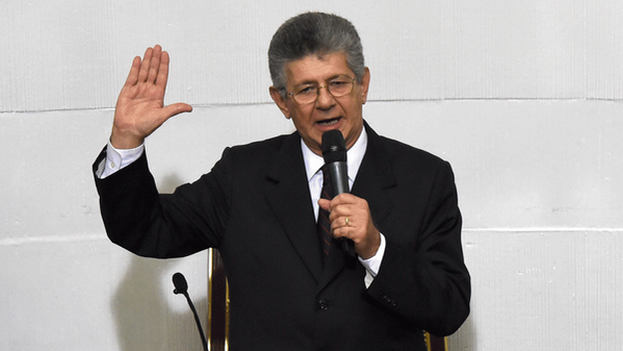
![]() 14ymedio, Yoani Sanchez, Havana, 6 January 2016 – If Hugo Chavez were alive and Fidel Castro active, the Venezuelan opposition would not have taken over the National Assembly. The comandantes knew that if they accepted an opposition majority in this body of power it would spell their political end. The Cuban leader eradicated the multi-party system in order to prevent something like this, while Chavez, leader of a military coup, shielded the electoral system and bought loyalty with oil.
14ymedio, Yoani Sanchez, Havana, 6 January 2016 – If Hugo Chavez were alive and Fidel Castro active, the Venezuelan opposition would not have taken over the National Assembly. The comandantes knew that if they accepted an opposition majority in this body of power it would spell their political end. The Cuban leader eradicated the multi-party system in order to prevent something like this, while Chavez, leader of a military coup, shielded the electoral system and bought loyalty with oil.
However, the worst nightmare of both just took shape in Caracas. This Tuesday the deputies from the United Socialist Party of Venezuela (PSUV) became aware of their overwhelming minority given their small number of legislative seats. In a place where they can no longer even see the image of the “eternal president,” Chavez’s followers received a democratic slap in the face.
Accustomed to legislating with a marked numerical superiority, the ruling party found their disadvantage a bitter pill to swallow and stomped out of the room. For them, the coming months will be a martyrdom because they will hear a flood on contrary opinions, they will be held accountable for their decisions, and they will see laws approved that will affect their own bloc.
In the Castro regime’s manual, one can read in great big red letters the maxim to avoid at all costs allowing political opponents to take the microphones. One lesson that the Plaza of the Revolution taught Chavez, but that his clumsy disciple Nicolas Maduro did not assimilate well. Maduro’s arrogance made him believe that he would win the elections of last December 6, and today he is looking hard for ways to tie the hands of the National Assembly.
While the Venezuelan Supreme Court was hearing the ruling party’s challenges to three deputies-elect from the Democratic Unity Roundtable (MUD), Cuban parliamentarians were meeting at the Palace of Conventions. In Caracas, everything was speculation and political tension, but in Havana the script was already well known: vote unanimously and, at best, listen to long hours of speeches about the supply of yogurt, the poor quality of the induction cookers recently hawked to the population, or the complications involved in obtaining a birth certificate.
Cuba’s National Assembly of People’s Power, led by Esteban Lazo, was once again the image of docility, but its Venezuelan counterpart was transformed, this Tuesday, into pure effervescence. The South American nation has become, as of this moment, a country difficult to govern. But what democracy is easy?
Now there is only one parliament in this hemisphere that functions as a ventriloquist for power. One country where the legislators applaud a ruler who attends the National Assembly dressed in an army uniform, and spits at the minister of the economy to stop blushing about the failure of his programs. In this nation, where for nearly six decades we have not heard a real debate among legislators, this Tuesday we were proud and envious of Venezuela.
